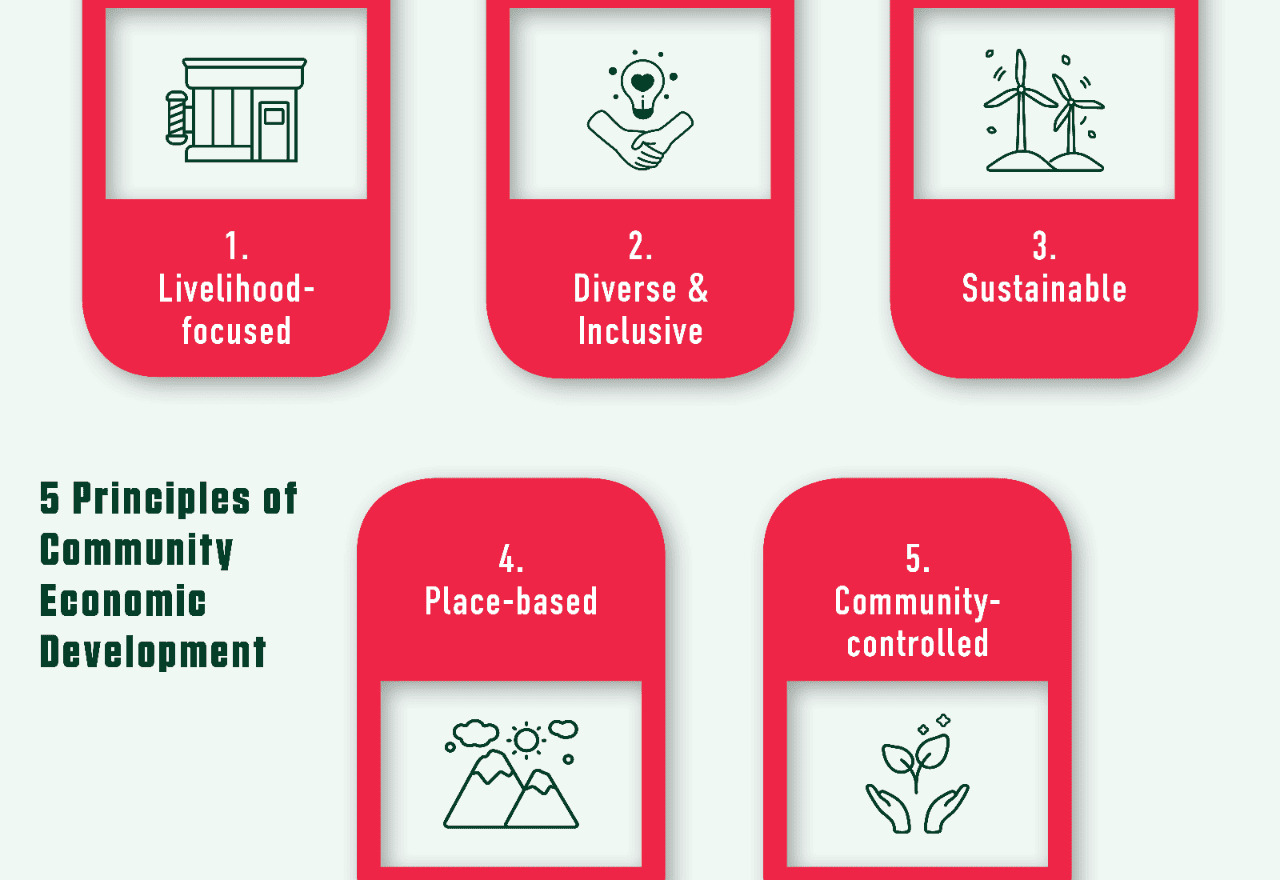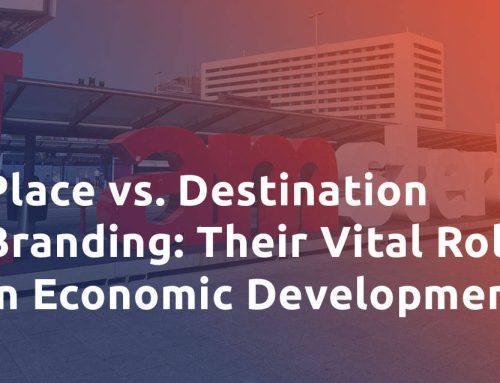In the realm of economic development, where strategies and approaches continually evolve, the concept of community economic development (CED) has emerged as a transformative force, empowering communities to drive sustainable growth, create jobs, and enhance quality of life for their residents. For economic development professionals seeking to make a profound and lasting impact, understanding the intricacies of community economic development has become a pivotal endeavor.
This article serves as a valuable resource for economic development professionals, exploring the tangible benefits, principles and best practices of community economic development.
Understanding Community Economic Development: Empowering Economic Development Professionals to Drive Local Growth
Community economic development (CED) is a comprehensive approach that aims to strengthen local economies and improve the well-being of communities. Initiatives and strategies are driven by a community’s social, environmental and economic priorities. It emphasizes the active involvement and participation of community members in shaping the economic development initiatives and decisions that affect their lives. CED is not just about attracting outside investments; it is about nurturing local entrepreneurship, fostering innovation, and promoting equitable economic development that benefits everyone.
Community economic development offers numerous benefits within the community, ensuring that communities shape their local economic future both strategically and practically. Firstly, it fosters local empowerment through extensive engagement with community members in decision-making processes, providing them with the ability to actively shape the future of their communities. CED strategies also promote economic resilience, encouraging diversifying local economies and reducing dependency on external factors. Through its focus on encouraging entrepreneurship, supporting small businesses, and promoting local resources, CED strengthens the economic foundation of communities, making them more resilient to economic shocks. Investments made within the community because of CED strategies also tend to generate a multiplier effect, circulating locally, stimulating further economic activity and creating a positive ripple effect.
Community economic development not only improves the overall economic well-being of the community but also enhances social cohesion and quality of life for residents. Ultimately, by harnessing the power of CED, economic development professionals can create sustainable, inclusive, and prosperous communities for the long term.
Explaining the Principles of Community Economic Development
Community economic development is a unique approach as it recognizes that economic development is impossible without a solid community development foundation thus blending the many aspects of both community development (building community assets & institutions) and economic development (creating economic opportunity).
While there isn’t a universally agreed-upon set of principles for CED, several common principles are often emphasized in the field. Here are five principles that are frequently highlighted:

(The 5 Principles of Community Economic Development)
Livelihood Focused:
CED views the economy as a means to enhance the well-being and overall quality of life for all individuals within communities. Rather than solely prioritizing profitability and production, CED views the ultimate objective of economic activity as the well-being of individuals and their livelihood. In line with this perspective, CED planning extends beyond a narrow focus on the “economy” alone and encompasses the intersections and interactions between various aspects of our communities and the economy.
Diverse and Inclusive:
CED prioritizes equitable and inclusive development. It seeks to reduce disparities and create opportunities for all community members, regardless of their socioeconomic status, race, gender, or other characteristics. This principle promotes fair access to economic resources, employment, education, and services, ensuring that the benefits of development are shared by all.
Sustainable:
CED promotes long-term sustainability by considering environmental, social, and economic factors. It seeks to balance economic growth with environmental stewardship, social well-being, and intergenerational equity. This principle encourages practices that minimize resource depletion, waste generation, and negative social impacts while fostering resilience and inclusivity.
Place-based:
CED focuses on identifying and leveraging the existing assets within a community. These assets can include physical infrastructure, natural resources, cultural heritage, human capital, and social networks. By building upon these strengths, CED aims to create sustainable and locally rooted economic opportunities.
Community-controlled:
CED places a strong emphasis on involving community members in the decision-making process. It recognizes that community members have valuable knowledge and expertise about their own needs, strengths, and aspirations. Engaging the community fosters ownership and ensures that development efforts are responsive to local priorities.
Practicing Community Economic Development: Strategies for Economic Development Professionals
Community economic development encompasses a wide range of practices that economic development professionals can adopt to empower communities and foster local economic growth. While there is no universal list of community economic development strategies or initiatives, by centering development initiatives on the principles discussed above, economic development professionals can develop the best practices unique to their communities.
Economic development professionals can also practice community economic development by looking outwards and turning to experienced organizations for assistance. One way this can be done is through the establishment of Community Development Corporations (CDCs) that leverage local assets to revitalize distressed neighborhoods. These CDCs facilitate affordable housing initiatives, small business development, and workforce training programs, ensuring that economic opportunities are accessible to all residents.
Other examples of community economic development practices that economic development professionals can implement include working on workforce development initiatives by collaborating with educational institutions and training providers to offer skill-building programs that align with local industry needs. This ensures that community members have access to the necessary training and qualifications for employment in growing sectors. Additionally, economic development professionals can also focus on promoting community-based tourism and cultural initiatives to stimulate the local economy. By highlighting unique cultural assets, organizing festivals and events, and supporting local artisans and businesses, economic development professionals can attract visitors and increase revenue within the community.
Breaking Barriers: Overcoming Challenges in Community Economic Development
Community economic development faces several barriers that can hinder its progress. One major challenge is the lack of access to capital and financial resources. Many communities, especially marginalized ones, struggle to secure funding for their development projects, limiting their ability to invest in infrastructure, education, and entrepreneurship. Further barriers include the absence of adequate skills and capacity within the community and other social and cultural factors, including resistance to change and a lack of trust among community members, can pose obstacles to community economic development initiatives.
Economic development professionals can employ various strategies to overcome these barriers and foster community economic growth. By focusing on establishing partnerships and collaborations with financial institutions, government agencies, and private investors, they may secure funding and resources for community projects. Furthermore, developing strong relationships with stakeholders can also provide access to missing capital and technical expertise.
Economic development professionals may also invest in securing education and skill-building programs tailored to the needs of the community that can enhance local capacity. By offering training in areas such as business planning, financial literacy, and technology, professionals can empower community members to actively participate in economic development efforts.
Finally, by building trust and engaging with the community through open dialogue and participatory decision-making, economic development professionals can address cultural and social barriers. Involving community members in the planning and implementation processes allows economic development professionals to foster a sense of ownership and collective responsibility, which aids in overcoming resistance and gaining support for development initiatives.
Key Take Aways for Economic Development Professionals
Community economic development is a crucial strategy for fostering sustainable and inclusive growth in today’s rapidly changing world. Economic development professionals play a pivotal role in driving this transformation, as they possess the knowledge, skills, and resources to empower communities and unlock their full potential. By adopting a comprehensive approach that considers the unique needs and assets of each community, professionals in this field can leverage their knowledge and skills to drive positive change.
From strategic planning and business attraction to workforce development and community revitalization, economic development professionals empower communities, create job opportunities, and enhance the overall quality of life for residents. By investing in community economic development, economic development professionals can truly make a lasting impact, leaving a legacy of resilient and thriving communities for generations to come.







